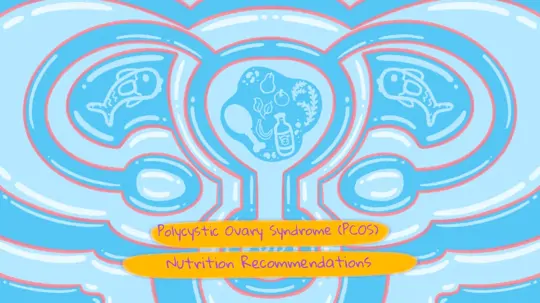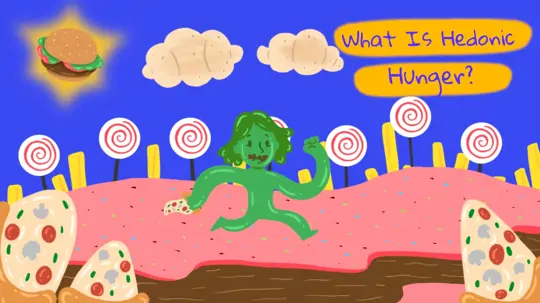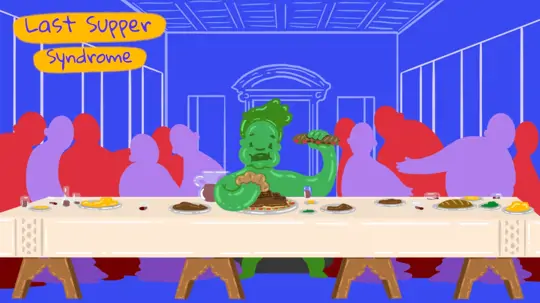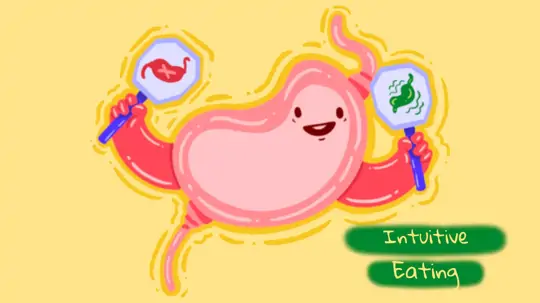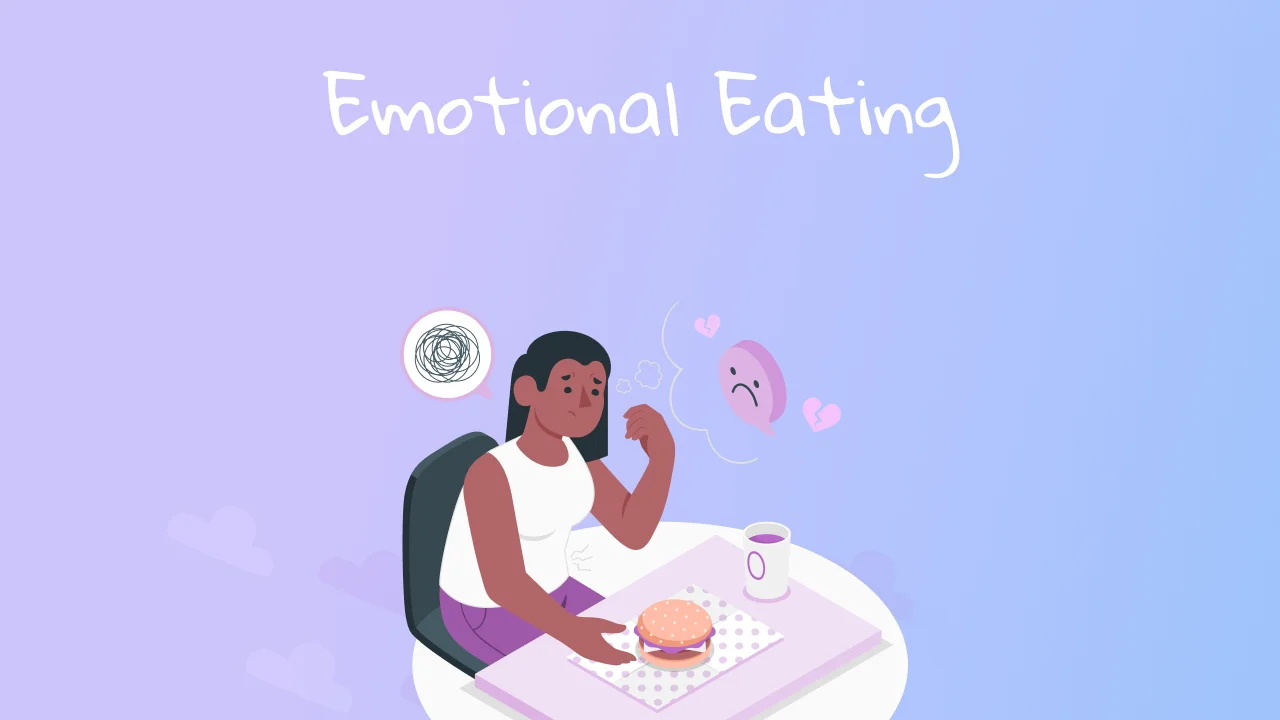
Start feeling better today!
Connect with your therapist today and take control of your life like our 850.000 happy clients.
Get StartedHave you ever noticed that you have a strong desire to eat when you are stressed out or after a breakup? Let's take a closer look at what actually happens here.
Emotional Eating
Emotional eating is defined as the tendency to eat food based on emotions rather than hunger1. This type of hunger appears suddenly in response to only one emotion, without any physical symptoms, and it is sometimes caused by emotions we are unaware of.
Managing emotional hunger can be challenging, especially during episodes of emotional eating. These attacks typically occur when negative emotions such as anger or sadness are intensely felt. When emotional eating behavior progresses to a constant desire to eat or binge eat, an emotional eating disorder develops.
Emotional Eating Disorder
Emotional eating was originally associated with eating disorders such as Bulimia Nervosa, but it has since been associated with Binge Eating Disorder as well. Although emotional eating is typically associated with negative emotions such as anger, depression, and stress, it can also occur in the presence of positive emotions2.
According to scientific research, people who struggle to recognize and manage their emotions use emotional eating as a coping mechanism3. However, such a fleeting behavior will inevitably become uncontrollable and unhealthy at some point. These issues are also referred to as binge eating disorders.
Emotional Eating Disorder Cycle
Emotional eating does not have a simple method of dealing with emotions. Understanding the long-term physiological and psychological issues caused by emotional eating is an important first step.
Consider the emotion of rage. Assume we are confronted with a situation that makes us angry. In such a situation, our preference may be to suppress and destroy anger immediately, especially when it is difficult to notice this emerging emotion, examine its bodily and mental consequences, deal with it as it is, and sit with it.
Individuals who engage in emotional eating tend to eat food to distract themselves from the emotion and the feelings it evokes, precisely at this point and for this reason, without feeling hungry.
The person who turns to food to reduce the negative consequences of anger and thus obtains short-term relief can repeat this behavior for every negative emotion they experience. As a result, as is well understood, a vicious circle is formed.
Unfortunately, this method and its repetition do not offer the same level of comfort over time. The emotions are still present. On the contrary, unhealthy and rapid weight gain as a result of excessive food intake can lead to physiological problems, and by preventing effective observation and management of emerging emotions, it can lead to a variety of psychological problems. So, how is emotional eating diagnosed? What is the cause of Emotional Eating Disorder?

Some Theories Explaining Emotional Eating
According to studies on negative affect and eating behavior, when a person experiences a negative emotion, a decrease in appetite and eating is expected. Because we, humans, experience physiological symptoms similar to a sense of fullness in situations such as sadness, anxiety, or anger1.
In the case of emotional eating disorders, however, the opposite is true4. In contrast, the person tends to eat more when confronted with negative emotions.
Explaining how this negative effect occurs is, predictably, perplexing 5. As a result, some theories have emerged to explain emotional eating:
- Psychosomatic Theory
- External Theory
- Obesity Theory
- Escape Theory
- Containment Theory
Psychosomatic Theory
The central concept of this theory is bodily awareness. The proposed idea is that people's ability to identify their emotions, as well as their awareness of hunger and satiety, are relatively insufficient, particularly in people with obesity problems. As a result, the person cannot accurately assess whether they are hungry.
According to this theory, because of a lack of bodily awareness, people exhibit eating behavior as a reaction to their emotions rather than authentic hunger1, 6.
External Theory
According to this theory, some people are sensitive to the external properties of certain foods. Sometimes it's the appearance or smell of the food. According to this theory, the mere presence of such an external stimulus has a greater impact on people than a feeling of hunger7.
Obesity Theory
According to Kaplan's obesity theory, which is based on what was learned in the early years, obese people tend to overeat in order to reduce their anxiety in stressful situations.
At this point, the individual has developed a relationship with food when faced with a neutral or anxious situation in their early life. Eating behavior when faced with physiological hunger can also occur when a person is in an anxious situation.
As a result, obese people may develop difficulty distinguishing between true hunger and hunger caused by a specific emotional state over time, and emotional eating may become frequent1, 3.
Escape Theory
According to this theory, emotional eating is a way for people to escape negative emotions, as the name implies8. This way, the person temporarily copes with their negative emotions. Every escape behavior, however, creates a vicious circle that weakens the person's will.
Containment Theory
Containment theory, developed by Lowe et al., deals with the cognitive restriction of eating behavior in normal-weight individuals. The aim here is to control weight, not lose it. As a result of this long-term restriction, binge eating episodes may occur, having the opposite effect6.
What Causes Emotional Eating?
So, what exactly causes emotional eating? How can a person realize that they are engaging in emotional eating? As previously stated, many different factors, from childhood habits to ever-changing situational differences, can contribute to the emergence of emotional eating.
In this sense, it can be difficult to understand why and how this disorder, which should be evaluated according to the individual and the situation, arises from time to time. On the other hand, studies have revealed some important details about the causes of emotional eating and the people and situations in which it can be observed.
According to research, emotional eating is more common, especially in certain groups. Excessive eating behavior is more common when confronted with negative emotions, especially in people with obesity, women with eating disorders, and people of healthy weight who are still dieting1.
Emotional eating is also linked to personality traits like low self-esteem, feelings of inadequacy, and impulsivity. Emotional eating is thought to exist in parallel with such situations1.
Given that emotional eating is typically a reaction to negative emotions and stress, it has been observed that emotional eating behavior may occur in the following situations2:
- Obesity or Having a High Body Mass Index
- Stress
- Depression
- Anger
- Menstrual cycle
- Traumas caused by natural disasters
- Modeling parents
- Boredom
- Happiness
As can be seen, many individual, situational, psychological, and emotional factors are linked to emotional eating in various ways and to varying degrees of severity9.

Eating Disorders and Emotional Eating
Eating behavior in response to emerging emotions was strongly linked to the presence of various eating disorders such as binge eating disorder and bulimia nervosa, as well as a specific group of obese people10.
Observations and studies also show that emotional eating is frequently linked to binge eating disorder. In both cases, eating is out of control. What distinguishes this case is the attempt to regain control over the effects of emotional eating.
Emotional Eating in Cognitive Behavioral Therapy
The cognitive-behavioral therapy model, which is based on the "triad" of thoughts, feelings, and actions, also uses this "triad" to explain emotional eating disorder and to plan how to treat it.
Based on the argument that emotions influence many of a person's behaviors, this model clearly demonstrates that emotions influence eating behavior. Furthermore, it perpetuates the cycle of erroneous beliefs that the person already has and may have had since childhood, such as "I am depressed, so I must eat," and thus similar beliefs are strengthened and consolidated11.
At this point, cognitive behavioral therapy works with the client to understand the relationship between the person's eating behavior and emotions, as well as to rearrange the person's dysfunctional coping strategies and beliefs.
Methods such as allowing the person to observe what is happening in themselves when an emotion arises, reconsidering ways of coping with the emerging emotion, and restructuring existing distorted beliefs and thoughts (cognitive restructuring) are frequently used in therapy to achieve this. The goal is always to help the person experience their emotions in a healthier and more effective way so that they can go on with their life12.
Cognitive behavioral therapy can be a good way to treat emotional eating, just like it can be used to treat eating disorders. Read our blog post to learn more about cognitive behavioral therapy.
How Can I Cope With Emotional Eating?
Adequate and healthy eating has an undeniably positive impact on physical and mental health2. There is a serious imbalance and uncontrolled food intake associated with emotional eating. Individuals who gain weight quickly and uncontrollably are in an unhealthy and dangerous situation.
In this sense, if we first focus on food when we feel a negative emotion in our daily lives and, as a result, engage in uncontrolled emotional eating behaviors, it is critical that we become aware of the situation and seek ways to cope in order to prevent emotional eating.
Early detection and awareness of emotional eating behavior are critical in order to prevent such behaviors and begin weight control earlier.
Tips for Overcoming Emotional Eating
- Change your eating habits.
- Recognize what emotions make you feel you need to eat.
- Discover the relationship between your emotions and food.
- Practice mindful eating.
- Consult an expert.
As previously stated, emotional eating can be influenced by a variety of individual and situational factors, and its severity can increase at times. In this case, a "personalized" plan prepared by mental health professionals is critical. You can meet and consult our expert licensed psychotherapists anytime from anywhere.
Sources
- Sevinçer, G. M., 2013, Emotional Eating, Journal of Mood Disorder.
- İnalkaç, S., 2018, Emotional Eating, Archive Review Journal.
- Özdemir, G.S., 2015, The Relationship Between Emotional Eating and Symptoms of Depression, Anxiety and Stress (master's thesis).
- Kalabaş, S., 2021, Investigation of the Relationship between Emotional Eating Behavior in Women with Anxiety and Self-Control (master's thesis).
- Match, M., 2008, How Emotions Affect Eating: A five-way Model, Department of Psychology, University of Würzburg.
- Canetti,L., 2002, Food and Emotion, Department of Human Nutrition and Metabolism, Hebrew University.
- Ouwens, M.A., 2003, Tendency Toward Overeating and Restraint as Predictors of Food Consumption, Department of Clinical Psychology and Personality, University of Nijmegen.
- Heatherton, T.F., 1991, Binge Eating as Escape from Self-Awareness, Department of Psychology, Harvard University.
- Serin, Y., 2018, Emotional Eating, Factors Affecting Food Intake and Basic Nursing Approaches, Journal of Psychiatric Nursing.
- Eldredge, K. L. and Agras, W. S. (1996), Weight and shape overconcern and emotional eating in binge eating disorder. International Journal of Eating Disorders, 19, 73–82.
- Kdtd.org.tr
- Oğuz,G., 2016, Obesity and Cognitive Behavioral Therapy, Current Approaches in Psychiatry
